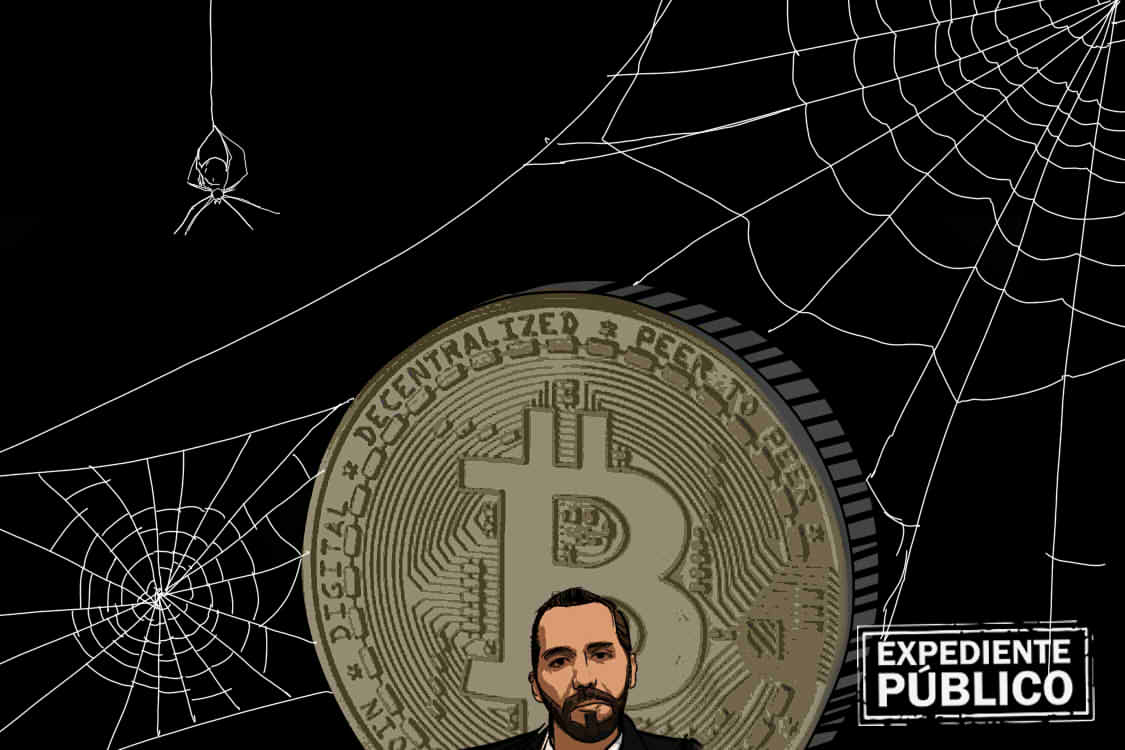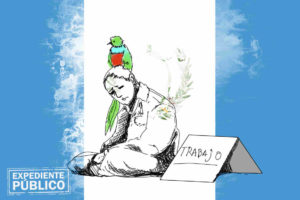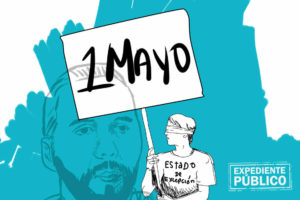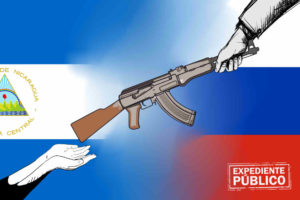* The Salvadoran president announced in 2021 that this Central American country would be the world capital of cryptocurrency.
** The government spent $120 million and created the Chivo e-wallet to popularize the use of the cryptocurrency, but it fell into disuse among citizens.
*** The project celebrated its second anniversary without the paraphernalia with which it began while the crypto value continues unstable.
Eric Lemus / Expediente Abierto
Carlos Rubio offers the rental service of a rustic cabin facing the ocean. The unhurried sound of the waves beating the rocks that line El Palmarcto beach, 47 kilometers from the capital on the Salvadoran coast, is one of the characteristic sounds in one of the places where signs offering cryptocurrency trading still survive.
Its location between El Tunco beach, the neighborhood of nightclubs, and El Zonte, where the bitcoin project was born, offers Carlos a literal intermediate position with respect to the development of what was the main economic bet of Nayib Bukele’s government.
“Here we use another electronic wallet that is not the one promoted by the Government because that wallet is not reliable and, to tell the truth, Bitcoin Beach is used among us merchants to facilitate the exchange of something that one has that another is missing,” he tells Expediente Público.
Subscribe to the Public Records newsletter and receive more information
“In my case, I prefer to rent the cabins and offer my restaurant services by paying in cash because customers move in dollars,” he explains.
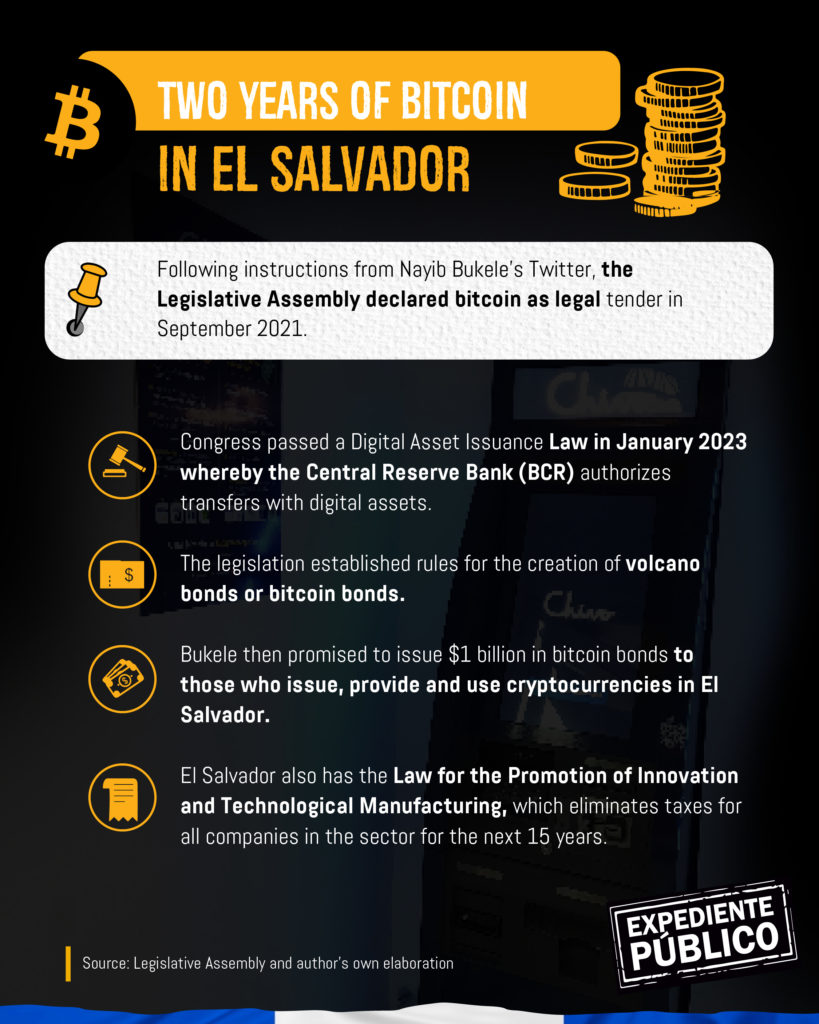
A transgressive announcement
Two years ago, in June 2021, Bukele burst into the city of Miami at the world’s largest bitcoin conference to announce in a public address that a country called El Salvador would be the first in the world to introduce cryptocurrency as legal tender alongside the dollar.
Among the participating speakers were a sort of transgressive businessmen and extravagant characters such as: Max Keiser, the so-called prophet of bitcoin; Tony Hawk, the legendary skateboarder; Jack Dorsey, former head of Twitter, and Sam Bankman-Fried, then head of the defunct crypto exchange FTX.
Also Read: El Salvador adopta el bitcoin entre protestas y pérdida de valor de la criptomoneda
El Salvador was the center of international attention after Bukele promised that this underdeveloped Central American country would be the bitcoin capital of the world and little by little a variety of eccentric subjects, apprentices of millionaires, and devotees of the cryptocurrency paraded through the country and were received by the government as official visits.
With the backing of the Legislative Assembly, which is under the control of the ruling New Ideas (NI) party, Bukele wove new regulations to stimulate digital assets in a country that has been dollarized since 2001 and whose one-third of the population resides legally or illegally in the U.S.
However, two years later, Bankman-Fried is imprisoned in New York awaiting trial for the embezzlement of FTX funds, Dorsey sold Twitter, and no one celebrates the second anniversary in El Salvador.
Bitcoin in El Salvador and the 2022 conference
In November 2022, El Salvador hosted the Adopting Bitcoin Conference for three days where the star voice was that of crypto promoter Max Keiser along with characters such as the Canadian Samson Mow, the founder of video game company Pixelmatic.
But unlike September 2021, when the value of bitcoin had reached its all-time high of $53,000, the cryptocurrency began to unravel.
Journalist Yves Bellinghausen, who followed the development of the conclave, reminded Expediente Público that “everyone expected Bukele’s intervention at some point, but he was the great absentee.”
In fact, on the night of November 17, 2022, Expediente Público was present at the closing of the conference in an establishment located on El Zonte beach and where the distaste of guests such as Mow was evident when he avoided making an assessment of the meeting.
See also: El Salvador está por caer en default y Bukele sigue comprando bitcoin
Although Bukele did not attend, the government did designate a fleet of private buses with a police escort between the capital and the so-called Surf City, in addition to the military deployment that followed all the guests like shadows.
Bitcoin’s volatility and its effect on El Salvador
However, the second anniversary of bitcoin’s incorporation into the Salvadoran economy was far from the party that Bukele organized on beaches such as Mizata, when he announced the construction of Bitcoin City, or in the Gulf of Fonseca, where the president promised to mine the Conchagua volcano.
Various academic and professional sectors oppose the president’s calculation, which continues to dissipate while waiting for the value to rise and he can recover the sum invested to date.
Economist César Villalona believes that introducing bitcoin “had two main effects: first, it is now very convenient to launder money in El Salvador, and, secondly, the introduction of crypto suddenly improved the country’s image.”
“Bitcoin is not a currency. It’s simply a business,” Villalona told Expediente Público.
While in the opinion of economist José Luis Magaña the $120 million it spent on the implementation of the entire project, the Bukele administration spent an amount comparable to twice the current budget of the Rosales National Hospital, which amounts to $62 million.
“The money spent on bitcoin is higher than the annual budget for secondary education, which is 103.9 million,” Magaña claims.
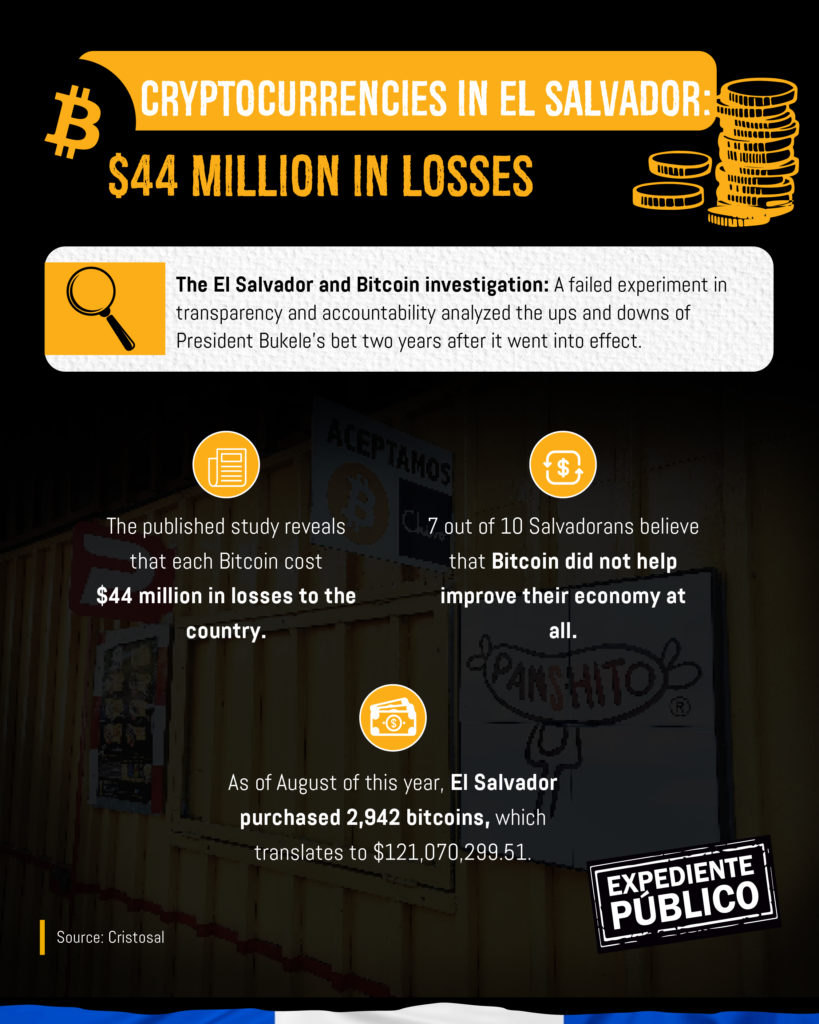
Take a step back?
At the beginning of 2022, the International Monetary Fund (IMF) warned that “the adoption of a cryptocurrency as legal tender involves serious risks to financial and market integrity, financial stability, and consumer protection.”
For its part, the investigation “El Salvador and Bitcoin: A Failed Experiment in Transparency and Accountability” warned that as of August 2023 the Government purchased 2,942 bitcoins, which translates to $121,070,299.51.
“According to the report, seven out of 10 Salvadorans consider that the adoption of bitcoin in the country has not helped at all to improve their family economic situation,” said lawyer Leonor López during a meeting with the press attended by Expediente Público.
Also: El Salvador está por caer en default y Bukele sigue comprando bitcoin
The IMF, in fact, urged the authorities of the Bukele administration “to limit the scope of the Bitcoin Law by eliminating its status as legal tender.”
“There are major risks associated with the use of bitcoin for financial stability, financial integrity and consumer protection, as well as potential tax contingencies,” he warned.
Life in the places offered by Bukele as centers of cryptocurrency transactions continues its daily commercial rhythm where “it is important to survive,” in the words of Carlos, the owner of the ranch in El Palmarcito, who experienced no changes in his business with bitcoin.
“Honestly, as merchants, the important thing is that customers pay us because that way we have minimum resources to make ends meet our obligations,” says this man who comes from artisanal fishing. “That’s our reality.”

